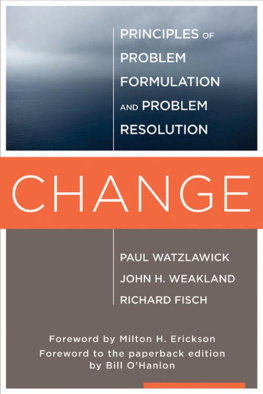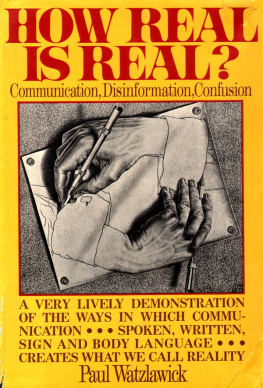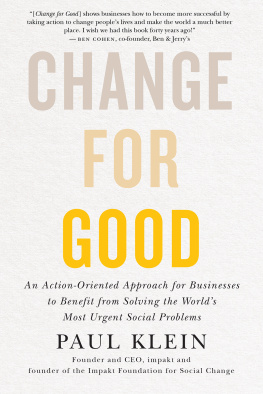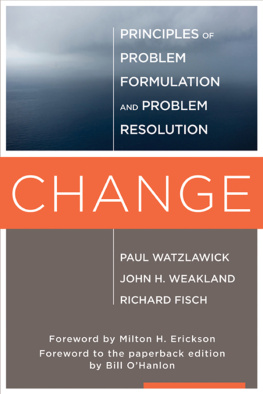CHANGE
Principles of Problem Formulation
and Problem Resolution
Paul Watzlawick
John Weakland
Richard Fisch
Foreword by Milton H. Erickson
Foreword to the paperback edition by Bill OHanlon

W. W. Norton & Company, Inc.
New York London
BOOKS OF RELATED INTEREST
Pragmatics of Human Communication
by Paul Watzlawick, Janet Beavin Bavelas, and Don D. Jackson
The Situation is Hopeless, But Not Serious
by Paul Watzlawick
The Invented Reality
How Do We Know What We Believe We Know?
(Contributions to Constructivism)
edited by Paul Watzlawick
The Interactional View
Studies at the Mental Research Institute
Palo Alto, 19651974
edited by Paul Watzlawick and John H. Weakland
Uncommon Therapy
The Psychiatric Techniques of Milton H. Erickson, M.D.
By Jay Haley
My Voice Will Go with You
The Teaching Tales of Milton H. Erickson
edited by Sidney Rosen, M.D.
Mirages of Marriage
by William J. Lederer and Don D. Jackson
Communication
by Jurgen Ruesch and Gregory Bateson
Preface to the 1987 Edition by Paul Watzlawick
To the memory of
DON D. JACKSON
(19201968)
Contents
Chapter 9. The Practice of Change
Foreword to the Paperback Edition by Bill OHanlon
P aul Watzlawick was born in Villach, Austria in 1921, the son of a bank director. He traveled far, spoke several languages fluently, and changed the field of psychotherapy. He passed away in March of 2007.
I first encountered the ideas and the work of Dr. Watzlawick while taking a family therapy course as an undergraduate student at Arizona State University. The instructor, Lorna Molinaire, used the structure of The Pragmatics of Human Communication as her outline for the first semester of a yearlong course. It was my first introduction to a different way of seeing the problems people bring to therapy. And it helped warp me for life.
Although Paul Watzlawick, a psychologist, was schooled in an individual approach to psychotherapy (he was trained as a Jungian), he found his way to a new view. And he was an integral part of bringing this then-radical view into the mainstream of psychotherapy practice.
Taken by his unique point of view and curious for more information, I stumbled on a hidden gem in the audiotape section of my universitys library and spent hours listening to a tape by Watzlawick on human communication ( An Anthology of Human Communication: Text and Tape ). In it, he told a charming story about a time when he showed up at a psychiatrists office. He wanted to discuss the role communication played in the development of schizophrenia with this particular psychiatrist, who specialized in treating the disorder. But due to Watzlawicks Austrian accent and the fact the his name was not on the psychiatrists appointment book, a simple misunderstanding occurred that showed a lot about communication and its role in problem development.
When Paul announced himself in a rather formal way to the secretary, he said simply, I am Watzlawick. She suspected he was a new psychiatric patient showing up for an appointment at the wrong time, and she interpreted his introduction as, I am not Slavic. To which she replied, I never said you were. At which point, slightly puzzled and a little irritated, he insisted, but I am. Several subsequent exchanges compounded the misunderstanding until they began to yell at each other. At this point, the psychiatrist, hearing the angry exchanges from within his office, poked his head out and said, What the devil is going on out here? Paul, why are you yelling at my secretary, and why are you yelling at Dr. Watzlawick? he asked his secretary. The misunderstanding was quickly cleared up at that point, but Watzlawick used the story to illustrate the importance of context, interaction, and human communication in problem development.
Dr. Watzlawick and I had our differences: he once scolded me when we were on a panel together for suggesting that clients had solutions to their problems that can be evoked for rapid change. If patients had solutions, they wouldnt come to therapy. Its because their solutions arent working or are the very cause of their problems that they seek our help, he thundered at me. I respectfully disagreed and today the solution-based approach to change is well established and accepted. Most clinicians would accept that clients often have their own solutions to problems that can help resolve them.
But Watzlawicks view reflected the hard-won knowledge that attempted solutions often made a problem worse or keep it in place. This is a view that I have found profoundly useful over the years with many clients, so I can appreciate his loyalty to it.
Hopefully the new edition of the book will find new readers and bring back previous ones to revisit this revolutionary tome.
While Paul Watzlawick is listed as the first author and his fingerprints are all over Change , the influence of John Weakland and Dick Fisch is also apparent in this volume. Less formal than the earlier collaboration between Weakland and Watzlawick, Pragmatics of Human Communication , this book still bears Watzlawicks philosophical bent, but is more clinical and full of wry humor (a Weakland trademark). Fisch, a psychiatrist, also had a sense of fun and humor that shines through the text. All were intensely interested in how to help people change, hence the straightforward title.
This book firmly established the Interactional Approach to psychotherapy. With an introduction by Weaklands mentor, psychiatrist Milton Erickson, a very rare, perhaps even unique thing, this book solidified a practical approach to change that influenced a generation of therapists and was passed down through many prominent therapists long after its initial publication. Erickson speaks in that introduction of the currents of change already seething within the person and the family. This book reflects the view that change is not only possible, but already seething within the problem situation. It presents some powerful methods for making change happen.
This is a well-written and extremely charming book. Although published in the 1970s, it is still relevant today. Its great to have it reissued by W.W. Norton. Read it. Read it again. It could change your life and your work.
Foreword
I would have preferred to say much more about this book than I do here. Unfortunately, ill health prevents me from doing that, but thereby leads me to come to the point at once.
There have been multitudes of books and theories on how to change people, but at long last, the authors in this book have looked seriously at the subject of change itselfboth how change occurs spontaneously, and how change can be promoted. I have attempted to understand this in my own work, and describe it in my own writings. Psychotherapy is sought not primarily for enlightenment about the unchangeable past but because of dissatisfaction with the present and a desire to better the future. In what direction and how much change is needed neither the patient nor the therapist can know. But a change in the current situation is required, and once established, however small, necessitates other minor changes, and a snowballing effect of these minor changes leads to other more significant changes in accord with the patients potentials. Whether the changes are evanescent, permanent, or evolve into other changes is of vital importance in any understanding of human behavior for the self and others. I have viewed much of what I have done as expediting the currents of change already seething within the person and the familybut currents that need the unexpected, the illogical, and the sudden move to lead them into tangible fruition.
Next page








